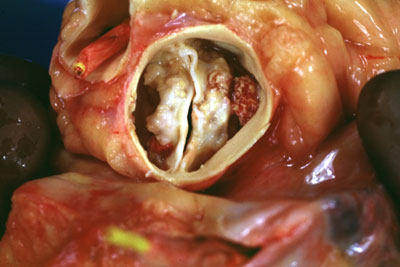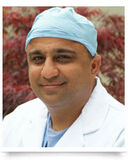“Is It Possible To De-Calcify A Heart Valve Without Repairing Or Replacing It?” Asks Gwen
By Adam Pick on January 15, 2013
I just received an interesting question from Gwen about the treatment of calcified heart valves.
Gwen writes, “Hi Adam – I was diagnosed with a murmur 12 years ago when I was 49 years old. It’s gotten worse and I’m told that I need surgery. My cardiologist said that the valve has severe aortic stenosis and the valve is calcified. I’m curious to know… Is it ever possible for the surgeons to “de-calcify” the valve without having to repair of replace the valve or its leaflets?”

Calcified Aortic Heart Valve (Aortic Stenosis
To provide Gwen an expert response, I contacted Doctor Junaid Khan, the Director of Cardiovascular Services at Alta Bates Summit Medical Center. As you may have seen, Dr. Khan and Alta Bates have hosted several educational seminars for patients in Northern California.
In his response, Dr. Khan noted:
The short answer to Gwen’s question is no. There is no current technology to de-calcify a valve. There are several “gimmicks” that patients find on the web. Some of these gimmicks reference chelation therapy. However, none of these approaches have been scientifically validated.

Dr. Junaid Khan, MD
Dr. Khan went on to address the growing use of aortic valve repair for patients as an alternative to aortic valve replacement.
Aortic valve repair is on the rise for calcified heart valves — although, this surgical technique is not used to the extent of mitral valve repair. The technique is generally reserved for patients with aortic insufficiency with normal leaflets and just dilatation. The theory and hope is that an aortic valve repair will have greater longevity than a bioprosthetic valve. However, there is not a consensus yet on techniques for repair — or its validity. The real problem is the inability to dynamically check the repair during surgery — like you can with a mitral repair. Also, the lack of a subvalvular support struture (like the mitral) limits the types of repair that can be done. The skeptics believe, you are just turning severe aortic regurgitation into mild aortic stenosis which is better tolerated and will hopefully last longer than a bioprostethic valve.
Thanks to Gwen for her question and a special thanks to Dr. Junaid Khan for sharing his clinical expertise with our community. To learn more about Dr. Khan, click here.
Keep on tickin!
Adam
|
Joseph says on January 16th, 2013 at 4:21 pm |
|
Believe me. I know that cardaic surgery will induce fear in anyone. It’s scary. But the alternative is an altered life style, or worse. I was dianosed with aortic stenosis when I was 52 years of age. Mild, became moderate, then severe, then critical. All over an 11 year period. I was 63 years of age and in great shape. I love to play tennis. One day, while chasing a shot into the corner, down I went. I was only out for about 5 seconds. But my buddies told me that I was out cold. That’s when I knew I was in over time. I stopped playing tennis and sat on my butt. I took up the guitar. It was killing me to not be able to get out on the court. So, I researched looking for the best Doctor in the world to save my life. I found Doctor Craig Smith at Columbia Presbyterian Hospital in NYC. He did an AVR on my in July, 2011. I was back on the court in 8 weeks hitting shots as well as I ever did prior to the surgery. Today, 17 months after surgery, I play 6 day’s a week, 2-3 hours everyday, both singles and doubles. My Cardiologist tells me the valve sounds great. I owe my life to Dr. Smith. What a Doctor. What a great guy. God Blesses this man everyday to do such great things for people whom would otherwise be in the ground. I’m one of the lucky ones. It takes courage. But courage is being scared to death, but you saddle up anyway. Go see Dr. Smith. Tell him Joseph sent you. Good Luck. |
 |
|
Steve says on January 16th, 2013 at 4:55 pm |
|
Thank you Joseph for sharing your story and that last sentence: ‘But courage is being scared to death, but you saddle up anyway.’ That’s where I am at…surgery on the 31st for mvp and mod/severe regurg…I can’t wait to be on the other side and enjoying my life and kids. |
 |
|
Joseph says on January 16th, 2013 at 5:11 pm |
|
Dear Steve, You will be GREAT! And when you wake up, your Life and your Children will be there waiting for you. Be a Warrior. A Marine. Kick Ass!!!! |
 |
|
Audrey M. Parker says on January 17th, 2013 at 4:08 am |
|
Dear Adam, Since having my Aortic Valve Replacement a year ago I have a concern around keeping my heart healthy. For instance are there any alternative supplements – herbs, vitamins, minerals that would help or maybe avoid? |
 |
|
Diane says on January 17th, 2013 at 5:34 am |
|
Your words are encouraging. I am a 60 year old female, and I AM SCARED to death. |
 |
|
Joseph says on January 17th, 2013 at 1:52 pm |
|
Dear Diane, You will survive. And you will play tennis again. WILL IT to be so! As they wheeled me into the OR I was singing a hymm to My LORD GOD. I fet the presence of Jesus walking along side my bed. When I entered the OR I was immediately surrounded with 4 beautiful surgical nurses. We joked, and we laughed. I asked the anesthesiologist to make sure he didn’t lose me, and to positively make sure that I didn’t wake up with “Pump Head.” We laughed, the next thing I remember was waking up in ICU with a gorgeous African American nurse looking down at me saying, “Joseph, the surgical team said you did great. My name is Kiesha, and I will be taking care of you.” I was on my feet in 6 hours, sitting in a chair. walking in 8 hours. Up a flight of stairs on the second day. It’s a piece of cake. Don’t worry. Be Bold, and Bold things will come. It’s not that bad. Just make sure you have the RIGHT surgeon. Give yourself every chance to win this fight . . . . . . I’m here if you need me, Be Blessed, Joseph |
 |
|
Diane says on January 18th, 2013 at 1:41 pm |
|
Thanks for your reply. It does encourage me. Diane |
 |
|
Bill says on January 19th, 2013 at 9:17 pm |
|
I had aortic stenosis which took some time to diagnose. The treadmill and MRI tests were positive, and finally the echocardiogram test told the story, since you can actually see what is going on. I had a bovine AVR in April 2012 and everything went perfect. Out of the hospital in 5 days. 8 months later I feel pretty good, like 90%. Also had 2 bypasses which may not last the 20 years that the valve will. I take L-Ariginine and L-Citrullene supplements(in addiditon to the prescribed heard medication) to help build up the Nitric Oxide that is said to prevent and reverse plaque. My experience at Kaiser Permanented in Santa Clara has been excellent and I highly recommend the Cardioligy Deptarment, led by my surgeon Dr. Hon Lee. |
 |
|
Joseph says on January 20th, 2013 at 1:10 pm |
|
Dear Bill, I read your post referencing the supplements that you take to reduce plague buildup. However, what is the HEARD medication that you also mention in that sentence in parenthesis? What is HEARD medication? New to me. Thank you, Joseph |
 |
|
Rick says on January 23rd, 2013 at 4:08 pm |
|
I just met with my surgeon to schedule my avr. |
 |
|
Ann says on January 26th, 2013 at 7:34 pm |
|
Two years ago, age 59, I had an AVR due to a stenotic bicuspid valve. At the time, |
 |
|
Joseph says on January 27th, 2013 at 6:45 am |
|
Dear Ann, I read your Post. I am so, so sorry to hear of this News. You mentioned an infection followed by a tooth extraction. Did you pre-medicate? WE, all of us, have to pre-mediacte if there is going to be Blood during any mouth procedure, including but not limited to Deep Cleaning. (Prophylaxis) In my case, I had a tooth procedure done when I was 52 years of age. I found out subsequently that it was a procedure I did NOT need. I sued the dentist and recovered. But I believe it was that procedure that started my BV valve to deteriorate. I watched it go from Mild to Critical in 10 years. At 62, I ended up in the OR. A word of caution to all of us. Be mindful of your dental health. Many of the infections that are oral in nature CAN, and WILL affect the heart. I will be praying for you, and ALL will be well. Be Bold. Joseph |
 |
|
Ann says on February 2nd, 2013 at 7:03 pm |
|
Dear Joseph, |
 |
|
Bill says on February 3rd, 2013 at 6:20 pm |
|
HI Bill again. This is to correct a typo where I referred to heard medication, but I meant heart medication. I was prescribed Losartin and Metropolol to control blood pressure and heart rate. Also, I was started on Coumadin since I had some A-Fib in the hospital. I requested heart monitor after about a month of Coumadin to determine if I still needed to continue taking Coumadin and suffer the negative side effects. After a month of the heart monitor and no A-Fib detected, the doctor relented and stopped the Coumadin. Hoever, he says there is still a risk and if it was up to him, I would be on Coumadin indefinitely. The heart monitor relied on me to detect A-Fib and press a record button, whcih I did a few times but could never be sure I was having A-Fib, and the recording results were negative. What is really needed is a heart monitor with the smarts to recognize A-Fib automatically, record it , and alert the patient. If anyone has knows of such a device, please let me know. |
 |
|
Bill says on February 3rd, 2013 at 6:50 pm |
|
Dear Ann, I too have had several root canals, and crowns, without antibiotics over my lifetime. I have had a relatively healthy lifestyle so I was surprised at my Aortic valve calcification. I had a bovine AVR in April so your experience is very relevant to me. My question to you is: what exactly was the failure mechanism of your valve? Did it fail gradually or suddenly, and what were the symptoms. I know you don’t know the cause of failure, but I’m very interested in what exactly failed in the valve. |
 |
|
Liz says on February 5th, 2013 at 9:50 pm |
|
I had a tissue valve in 2007 at the Cleveland clinic in Ohio. the past 2 years I have had a lot of pressure near my diaphragm. I find it painful to wear a bra and it the lower part of my ribs are sore. The pain radiates to my back and I have been taking a lot of a ti inflamatories. Has anyone had this problem? I wondered about scar tissue or where the ribs are wired after replacing the valve. Please write if you know of any possibilities. |
 |
|
Ann says on February 24th, 2013 at 6:16 pm |
|
Dear Bill, |
 |
|
John Petrick says on May 3rd, 2013 at 8:54 am |
|
Recently, after sonic test of the heart was diagnosed with aortic stenosis(severe around .6). I am 74. I been asked to come in for a stress test in order to determine on the survival curve how long I have before I should have the surgery. I this normal or should I be immediatetly be on the the way to surgery? |
 |
|
Ed Wilson says on May 10th, 2017 at 6:55 pm |
|
For the benefit of anyone stumbling across this older thread, here is some more recent information that has surfaced since this was written. Below is a link to a peer reviewed journal article that suggests certain chelating agents can reverse calcification of aortic tissue in vitro. “Efficacy of Reversal of Aortic Calcification by Chelating Agents” …”We show that both EDTA and DTPA could effectively remove calcium from … calcified tissues.” Among the tissue were “calcified human aorta in vitro”. If anyone is aware of research yet showing the same in humans, that would be quite interesting. The double-blind peer-reviewed TACT trial was quite impressive, but didn’t address calcification directly, just the reduction in death rates. |
 |
|
Larry says on January 3rd, 2019 at 3:37 pm |
|
“Some of these gimmicks reference chelation therapy. However, none of these approaches have been scientifically validated.” This is trick wording used by the medical profession, when they feel threatened. It also usually means there is has been no scientific invalidation of the procedure(s) either. Mainstream medical practitioners are mostly afraid of their own gestapo tactic style membership groups that can blackball them into bankruptcy, and therefore doctors will not come out of the box in public. It could interfere with established medical money grabs. |
 |












